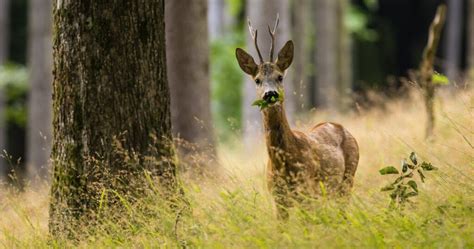Deer are one of the most iconic and widespread mammals in the world, with over 60 species found across various continents. One of the most interesting and important questions about deer is their dietary habits, and whether they are herbivores or not.
What are Herbivores?
Herbivores are animals that primarily feed on plants and plant-based materials. This includes fruits, leaves, stems, roots, and other vegetation. Herbivores play a crucial role in ecosystems, helping to disperse seeds, regulate plant growth, and maintain the balance of nature.
Deer as Herbivores
Deer are generally classified as herbivores, with a diet that consists mainly of plants and plant-based materials. They are ruminants, meaning they have a four-chambered stomach that allows them to break down and extract nutrients from plant material.
Deer feed on a variety of plants, including:
- Leaves: Leaves are a staple in a deer's diet, with many species feeding on leaves from trees, shrubs, and herbaceous plants.
- Grasses: Deer feed on various grasses, including tall grasses, short grasses, and aquatic grasses.
- Fruits: Deer enjoy a variety of fruits, including berries, apples, and other soft fruits.
- Twigs and Bark: In the winter months, when other food sources are scarce, deer may feed on twigs and bark.

Benefits of Being Herbivores
As herbivores, deer play a crucial role in maintaining the balance of ecosystems. Here are some benefits of being herbivores:
- Seed Dispersal: Deer help disperse seeds by consuming fruits and then depositing the seeds in new areas, often with a pile of fertilizer.
- Plant Regulation: Deer help regulate plant growth by feeding on certain species, which can prevent overgrowth and maintain diversity.
- Ecosystem Balance: Deer help maintain the balance of ecosystems by controlling the populations of certain plant species, which can prevent overgrazing and maintain the health of the ecosystem.
Challenges of Being Herbivores
While being herbivores has its benefits, it also comes with challenges. Here are some challenges that deer face as herbivores:
- Limited Nutrients: Plant material can be low in certain nutrients, such as protein and fat, which can make it difficult for deer to survive.
- Seasonal Variability: The availability of plant material can vary greatly depending on the season, which can make it difficult for deer to find food.
- Predation: Deer are prey animals, and as herbivores, they are vulnerable to predation from predators such as wolves, coyotes, and mountain lions.

Adaptations of Deer as Herbivores
Deer have evolved various adaptations to survive as herbivores. Here are some of these adaptations:
- Specialized Digestive System: Deer have a four-chambered stomach that allows them to break down and extract nutrients from plant material.
- Camouflage: Deer have evolved camouflage coats that help them blend in with their surroundings, making it easier for them to feed and avoid predators.
- Keen Senses: Deer have keen senses, including eyesight, hearing, and smell, which help them detect predators and find food.
Interesting Facts About Deer as Herbivores
Here are some interesting facts about deer as herbivores:
- Deer can eat up to 5-10 pounds of food per day, depending on the species and the season.
- Deer have a highly developed sense of smell, which helps them detect predators and find food.
- Deer are social animals and often live in groups, which helps them protect themselves from predators and find food.

Conclusion
In conclusion, deer are herbivores, with a diet that consists mainly of plants and plant-based materials. As herbivores, deer play a crucial role in maintaining the balance of ecosystems, and their adaptations have allowed them to thrive in a variety of environments. Whether you're a wildlife enthusiast, a nature lover, or simply someone who appreciates the beauty of deer, understanding their dietary habits and adaptations can help you appreciate these amazing creatures even more.
Gallery of Deer Eating Plants






FAQ
What do deer eat?
+Deer eat a variety of plants, including leaves, grasses, fruits, twigs, and bark.
Why are deer herbivores?
+Deer are herbivores because they have a specialized digestive system that allows them to break down and extract nutrients from plant material.
What adaptations do deer have as herbivores?
+Deer have a number of adaptations as herbivores, including a specialized digestive system, camouflage coats, and keen senses.
